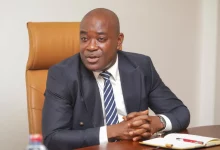It is a pity that Ghana boasts of experts in the field of internal audit and anti-graft bodies, yet corruption in the country keeps rising, which simply shows that those involved in it are not being checked enough.
The recent history of the country’s corruption index shows a chequered pattern but one that proves that corruption is still endemic in the country.
For instance, the index was 39 in 2011, rose to 48 in 2016, fell to 40 in 2017 but rose to 43 in 2020.
This picture tells those who care that the fight against corruption in the country is far from being won.
That is why it gladdens the heart of the Ghanaians Times that the Internal Audit Agency (IAA) is partnering with prosecutorial institutions like the Economic Organised Crime Office (EOCO) and Office of the Special Prosecutor (OSP) to prosecute persons indicted in its reports for various financial infractions.
By inference, this paper can say the IAA is telling the whole world that it acted in isolation of these bodies and so did not achieve much in its fight against corruption.
If that is the case, then the IAA should act out that promise. We are forced to say this because the IAA annually and ritualistically promises at its forums to up its fight against corruption.
However, it sometimes cites certain problems as militating against its efforts. For instance, at its 10th annual forum held in Accra on October 22, 2015, it cited poor conditions of service of internal auditors in the public service as undermining efforts to adequately staff its unit across the country.
Have the problems been solved such that current decisions can be implemented?
The IAA, at its Annual Conference in Accra on Tuesday, said it would name and shame institutions that failed to comply with the Public Financial Management (PFM) Act by way of submitting their internal audit reports.
It further said a list of defaulters would be published by next week in the dailies as part of measures to ensure judicious use of public funds and reduce corruption to the barest minimum.
Once, among other roles, as a newspaper, the Ghanaian Times serves as a mouthpiece for the voiceless, it wishes to say that the public really wants to see corrupt people being prosecuted and imprisoned or their property confiscated.
The truth is that members of the public know the corrupt people but lack the legal basis to deal with them, which is why it becomes so worrying when state institutions mandated to fight corruption fail to prosecute their assignments.
The perception is that auditors are principal actors in aiding corruption, particularly in the public sector.
The Ghanaian Times believes this time round the auditors themselves would do introspection and prove the public wrong with the evidence of what they can do to fight corruption in Ghana in the interest of national development.



